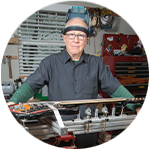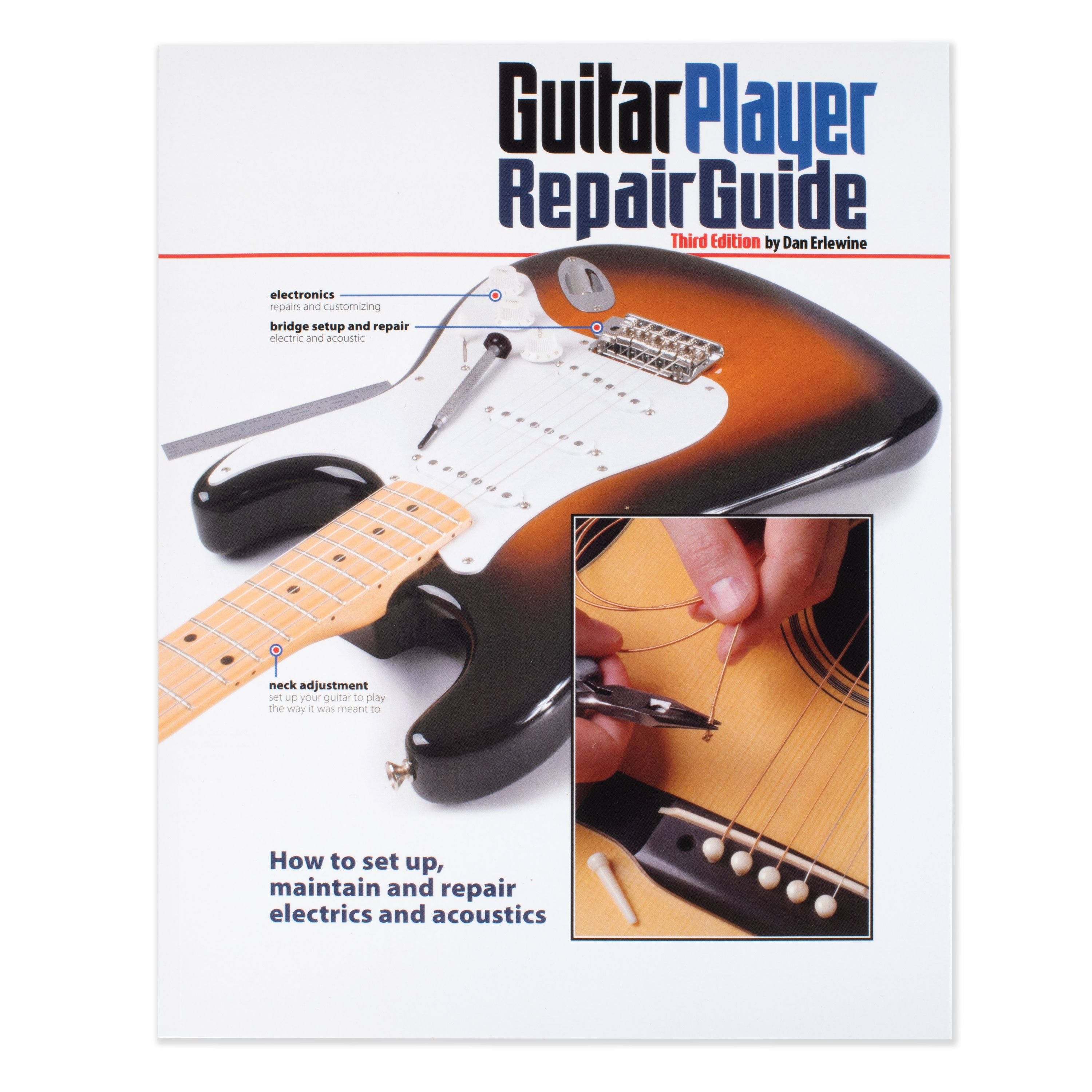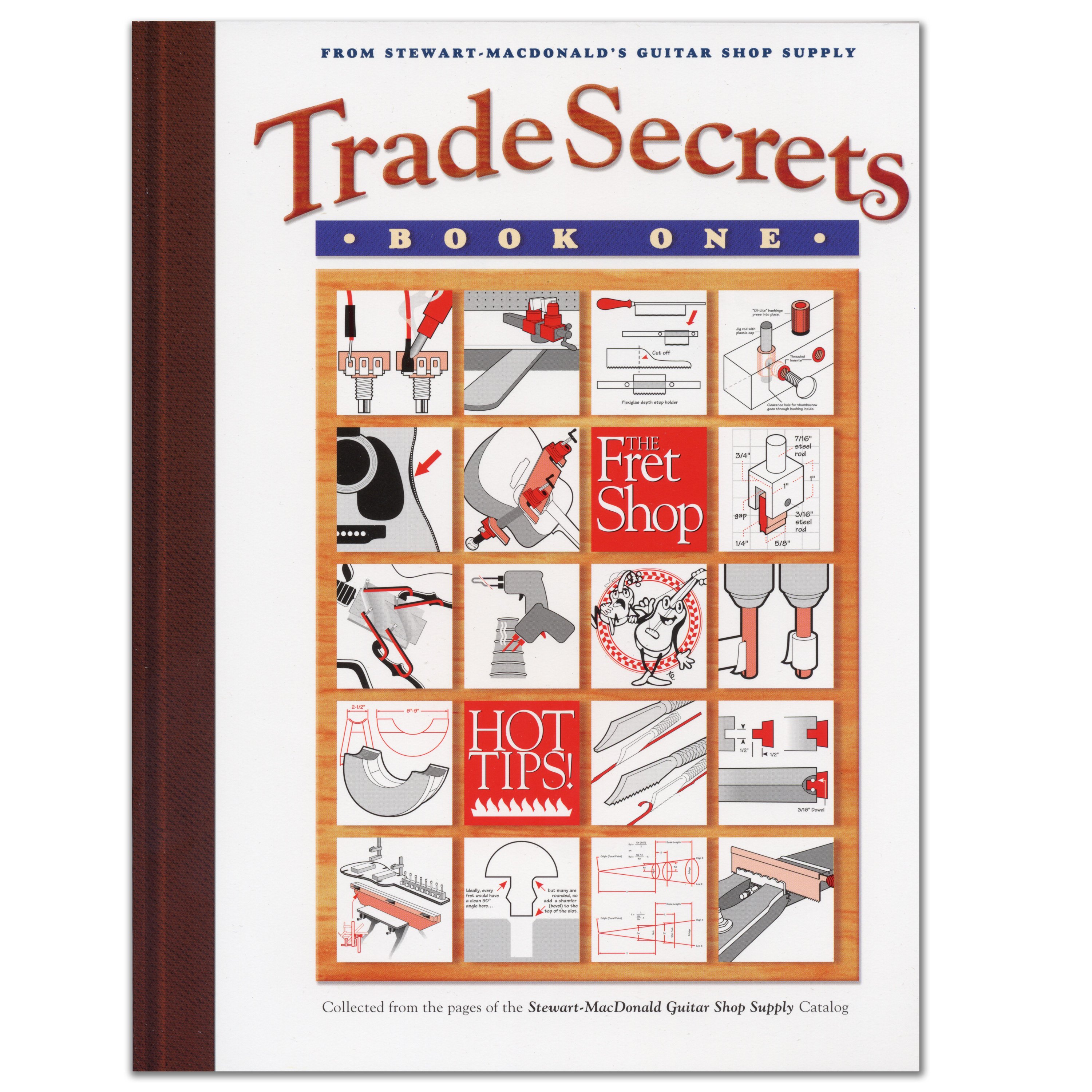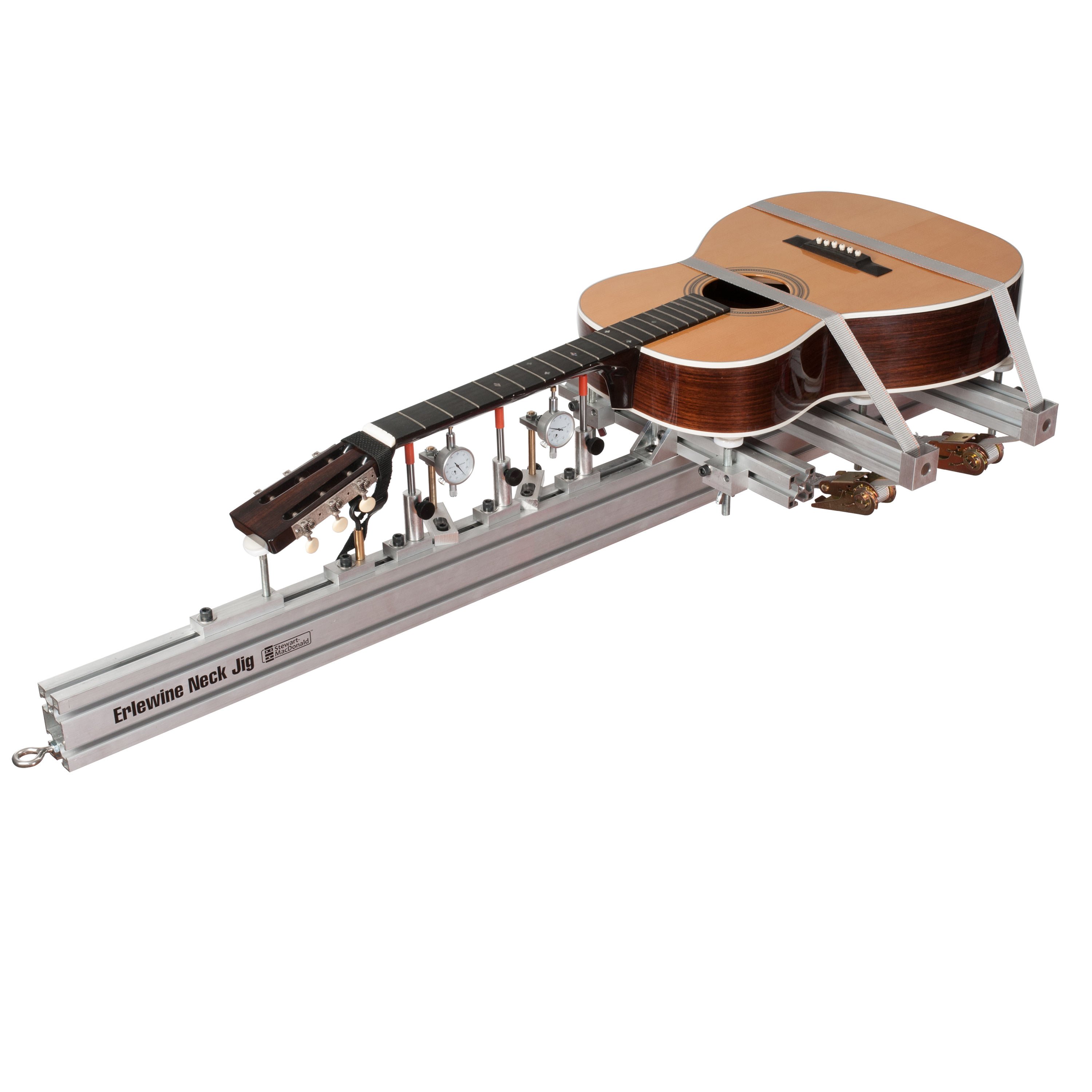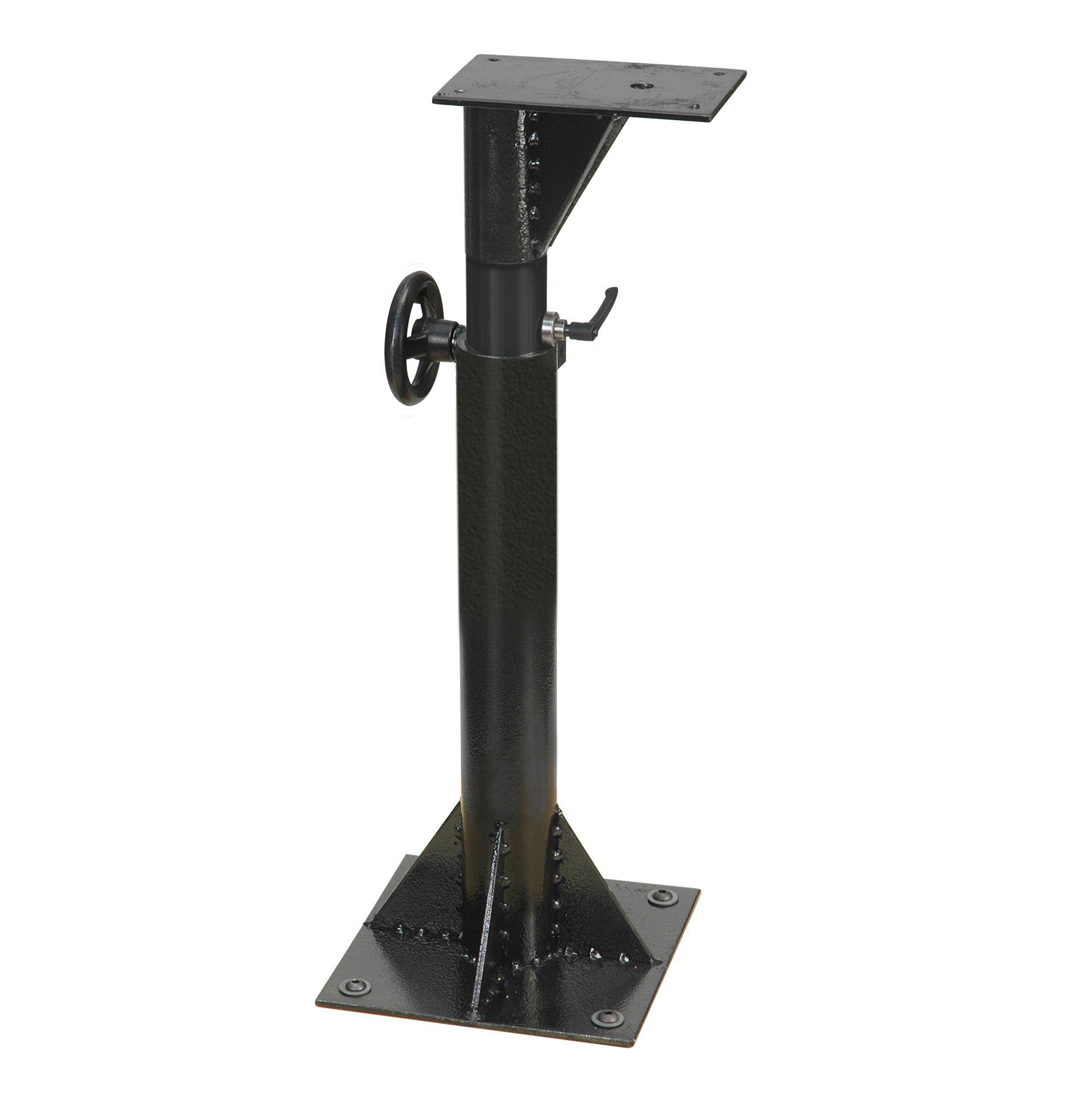Dan Erlewine: The Master Luthier Who Changed Everything
Join us in celebrating the legendary Dan Erlewine, a true icon in the world of guitar craftsmanship. From a small-town repairman to a globally revered educator and innovator, Dan has inspired millions to learn, build, and repair guitars.
In this special 80th birthday tribute, we take you through how Dan became one of the most beloved figures in the guitar industry, shaping StewMac into the company it is today. We are honored to recognize his unparalleled contributions and express our deepest gratitude for his lifelong dedication to the craft.
Video Transcription
[on-screen text reads: StewMac Presents]
Speaker 1: All right, let's do it.
Dan Erlewine: Let's do it.
Speaker 1: Take one. Ready, Dan?
Dan: Yep. (camera shutter click)
Speaker 1: Whenever you're ready. Action. Dan.
Dan: Today's trade secret is... No. One more. (camera shutter click)
Speaker 1: All right, here we go. Intro take two.
Dan: Today, I'm going to give you five tips. No. Does it look like I'm reading? (camera shutter click)
Speaker 1: No, it doesn't.
Dan: Okay, ready?
Speaker 1: Here we go. Take three. Cameras are rolling.
Dan: Hi. Today, I've got a screw lose, not me, on this Epiphone Riviera that belongs to James that works at StewMac with me.
Honoring legendary luthier Dan Erlewine on his 80th birthday
[on-screen text reads: Susan Hilvert, StewMac Video Producer | 2018-2024]
Susan Hilvert: A few years ago, we at StewMac decided to make a video tribute to Dan Erlewine on the occasion of his official retirement. Well, Dan is one of those guys that doesn't actually ever retire. He was continuing to host videos and hang around StewMac, and we just never found an appropriate time to publish that video. Well, today folks is Dan Erlewine's 80th birthday. We thought we would honor him by showing that video to you now. So here's to a legendary luthier, educator, innovator, and dear friend, our Dan Erlewine. Hope you enjoy it.
Dan: Cut, cut, cut. Was good, but give me more emotion like you'll really going to miss me.
Susan: I see you all the time. I'm not actually going to miss you.
Dan: We're still going to do it again. Take 32.
How Dan got started making luthier videos
Speaker 4: Dr. Dan to emergency. Dr. Dan to emergency.
Dan: Hi, I'm Dan Erlewine. Perhaps you think of this as a real nasty case. Not true. Here at the Guitar Hospital, we had dealt with this sort of problem many, many times. Honestly, it was my older brother, Michael. Michael had bought a PK-957 Panasonic, the first consumer-grade video camera. He loaned it to me. He said, "What you should do is take videos of what you're doing and show people."
Five millimeters, three millimeters. Those videos were very important. That's how I found StewMac or they found me, and of course, my brother Tom, he's a brilliant artist and illustrator.
Tom Erlewine: Dan was working as a small repair shop and wanted to be doing more repair work, and so we collaborated and thought about it.
Dan: Back then, you only could find a guitar repair shop in a big city, and there weren't that many, New York City, Philadelphia, Chicago, oddly enough Ann Arbor, Michigan, Denver, and then San Francisco, and that's where you could get a serious repair job done.
[on-screen text reads: Tom Erlewine, Brother/StewMac Creative Director | 2000-2023]
Tom: We did this thing which was, "Doctor, can this guitar be saved?" And this was when Dan was going to be offering repairs in your music shop. That went on to, "Hey, why don't you just train your guy in the back room to learn from Dan's videos?" And the idea there was, if your music shop is sending repairs to Dan, you're losing business. And so we had this little flyer, had a picture of Dan in a prison suit, said, "I've been stealing your customer for X number of years. Stop me before I do it again." So was all this stuff to try to make an impact with Dan and his business and it made an impact.
[on-screen text reads: Jay Hostetler, StewMac VP Product Development | 1977-2023]
Jay Hostetler: We met him, I believe in 1984 or 85 at a trade show in Chicago. Dan was ahead of his time in producing DVDs on guitar repair.
Dan: I may be an amateur photographer, but I'm a damn good repairman. And I always try to be fair by packing as much information into these courses as I can. Usually, if it's a quarter inch plow, all you need to do is lock the quill and run it back and forth, then go to your next three eights, do the depth shot, lock the quill at that three eights, run it back and forth, and you'll get a smooth wall. [foreign language 00:03:51]. Hello. [foreign language 00:04:03].
How Dan's career at Stewart-MacDonald got started
Jay: He was at the trade show. We were at trade show and by chance we got to meet him. Stewart thought, "Well, this is interesting. I think I'll go meet him in Michigan." So he planned a trip up the coast of Michigan and stopped in to see Dan, came back and I said, "Well, how'd that go?" And he said, "Great, we're going to hire him." So I said, "I had two questions. One of them was, how clean was his shop?" We'll get back to that answer to that one, and the second was, "What is he going to do?" So he brought him in and I was the shop foreman at the time. I had Dan do things like take a pile of wood out to Amesville and plane it to bring it back to make workstations, which was the original neck jig. Dan came back and was like, "I'm never doing that again. That was awful." And I'm like, "What do you mean you're never doing that again? You're working in the shop."
Dan: I was used to being my own boss doing whatever I felt like. To keep someone like me in line isn't easy because I'm always thinking of doing this and that, and eventually I got to do it that way.
Jay: That tussle went on for a few years trying to figure out exactly where Dan fit in. All the while Dan was writing articles for Guitar Player Magazine.
Tom: Let's get him into Guitar Player Magazine, and that was like the big scheme. And so for that, we invented a bass. I drew the body and he had this cello style peghead. We called it the Early Wine Lifetime Bass because it's the only bass you're ever going to want. We took a picture of it like Dan was a little factory or something and got it into Guitar Player Magazine and not long after that, he started writing articles for them and that's what got lots of people knowing about him.
Jay: In 1990, this book came out, which was a compilation of all of Dan's articles. I'll open this one up because it's signed by Dan back in 1990 and it became obviously the Bible around the world for guitar repair.
[on-screen text reads: Mike Lindskold, StewMac VP Digital]
Mike Lindskold: I came to know Dan Erlewine from Guitar Player Magazine. I've been interested in guitar since around 1980, and when Dan started his column, it was one of the very first things that I would go to read because I was just as interested in learning how to play as well as build and understand these guitars.
Jay: So at this point, we started using him more for educational stuff, doing videos.
Dan: Hi, I'm Dan Erlewine and welcome to Guitar Electronics and Hot Rod Techniques.
Jay: So all these were being sold and Stewart-MacDonald's name was growing in the guitar world thanks to Dan being here and bringing in more tools.
Dan: I'm always finding a new way to do any job because I would get bored doing it the other way. I met Don MacRostie. Don ran the machine shop. He once said to me, "I don't have any ideas, but I can make them into products."
Don MacRostie: I always liked Dan's ideas. He would rough it out in a rough form, but we couldn't sell something like that to a customer. I always looked at my job as distilling it, the least number of little components, so it was manufacturable. We'd have a list, new ideas would get thrown on the list, and this list was always churning and it was all kinds of things.
Dan: If I'm doing any kind of accurate work in the shop, I'm wearing the OptiVISOR and I have been for 25 years, so long that I often forget I'm wearing it. I'm Dan Erlewine and this is the ShopStand. Hi, I'm Dan Erlewine. I'm in my guitar shop to show you the Guitar Repair Vise, and I thought you'd like to see how I solve the problem of getting a good string spacing at the nut when I start out.
From tight lipped to knowledge sharing: How Dan changed the luthier industry
Tom: At that time, everybody doing repairs and lutherie seemed to be trying to hold their secrets real tight to themselves. If they knew how to do it, they weren't going to tell you because then you'd be a competitor. Between the guitar player articles and the videos, everything about Dan is here's how to do it, sharing how to do it, and that whole sharing thing, that's really the core. That's really what the whole thing is about. It's about sharing information, so Dan just gave it all away from the start.
Dan: There you have it. That's how to mix hot hide glue and you can heat it and cool it and heat it and cool it and it'll last you for weeks and you'll learn to love it just like I do.
I didn't like the fact that other people wouldn't share things with me. In the early 60s when I would go to Paul's Music Store and I would ask to buy some fret wire, he wouldn't sell it to me. The same with a nut. I wanted to buy a nut or a blank for a nut and he wouldn't sell it to me. It's kind of like the guilds in Europe. You just don't pass that information on. It could affect your livelihood. That's how I got the name Trade Secrets, the invention of my brother Tom and I, we filled the catalog with up to eight pages some years, people would send in their new ideas.
I encourage people to send us their ideas because we learn so many things that way. Someone like me can't hold it inside. I want to show people. I'm proud of what I do. I get excited, and when you have people that to share it with, that's just a wonderful thing. I got to interview B.B. King in 1991 for Guitar Player Magazine and he was playing his very first own model of Lucille and I put it in the Guitar Player Repair Guide. When it was all done, he let me take Lucille and play it, and he played chords for me. He says, "Go ahead," and I was playing BB King licks and I know a lot of them.
The professional musician
Elliot John-Conry: Not everybody knows about Dan. You actually have that in common with him. Dan was a professional musician before he started into the building and repairing his-
Todd Sams: Playing with some heavy hitters too.
Elliot: Yeah, definitely.
Dan Erlewine: Well, Iggy Pop, as he's known today, was a really good buddy of my wife, Joan. He put Joan and I together, kind of played matchmaker. He was in a band called The Iguanas. They were a rock and roll fraternity band and we were trying to be a blues band. We stole him away from The Iguanas. He wanted to join our band. We named him Iggy because that was short for Iguanas, so Jim and I were roommates for a year or so. I got a photo of that walking down the street in Ann Harbor in a hot summer. Not even wearing shoes, hippies.
Apprenticing with Dan
It's not that I don't love this 1940 J35. I love it and it's wonderful, but it's kind of big for a little guy like me. That's why this little sweetheart is my favorite. Let's give him one.
Speaker 11: All right.
[Dan starts playing an acoustic guitar with his apprentice]
Elliot: Dan's always had apprentices in his shop. I started working for him when I was 14, maybe 15. Really, I just did the old-fashioned apprenticeship where people would go find a trade master and some other apprentices the time that I was there, and he's got a whole new crop of apprentices now, and there were people before me, lots of people. That gives more weight to all his educational stuff because he actually lived it.
Todd: And continues to live it.
Elliot: Yeah.
Lorna: Wow. I wouldn't have been able to do it if you hadn't showed me how to.
Dan: Maybe, but you can do it next time.
Lorna: Next time.
Dan: Take it away, Lorna. First try. Sounds good so far. Only on a banjo.
[Lorna plays the banjo and people start singing]
[on-screen text reads: Paul Lampley, Dan's Apprentice | 2015-2024]
Paul Lampley: So we're in my shop on Court Street in Athens, Ohio. It's full of stuff that Dan has either paid me with such as this bench. This is an old craftsman chest from Dan, an old machinist chest that Dan built. A lot of my power tools, my neck jig is from his shop. He was just like, "Yeah, take this. You need this." Once you're in, you're in. It's like family. Went through a really rough patch like a year after working for him. He fired me twice that year and it was just like, "No, you're done. Go home." He followed up and was like, "Hey, just take a week or two off and come back. We'll have a beer and talk this over and get back at it." Dan's been there at times for me when I felt completely alone. My wife and I, when we were dating, we separated for nine months and he was integral in picking me back up through that and got me through it.
18 months later, I was fortunate enough for him to accept my invitation to be a groomsman at my wedding. He was just so touched that I thought of him that way and I was just like, "Dude, this is a friendship of a lifetime." I will think about our friendship forever. He always says in the shop, "If you want to be a better luthier, be a better person." When you start to apply that to your life, your work gets way better. Adaptability, thinking on your feet, research, thinking things through, being patient, staying focused because it's those moments where you're thinking about the hardships in life that you make mistakes in your work.
[on-screen text reads: Gene Imbody, StewMac Tech Advisor/Video Host]
Gene Imbody: So when I came to Dan, it was like a master's class. Coming from a repair shop where I had to every day have so much output in order to pay my bills and keep the shop work moving, coming into Dan's was a whole new experience because he didn't have to operate like that. His whole job is education and coming up with new tools and new ideas to share with the world, so I paid attention to details I didn't pay attention to before and it made me such a better repairman.
Dan: Speaking of wiring, since this is such an important job to me, I've asked the best wiring man I know, Gene Imbody. Come on Gene. Gene and I have worked on guitars for 30 years. He works at StewMac and he's going to do the honors here.
Gene: Thanks, man. I really appreciate you bringing me in on this. Vintage Gibsons are my favorite. We'll pull apart that PAF and pull the coil cut wire out, put a new lead wire on it. I've aged some covers that I think are going to look great on this.
Dan: God. Yeah, those came out really well. Oh boy.
Gene: Teaching is an art in and of itself and teaching on video and connect with people through a camera lens, even now, even comments on 10-year-old videos of people who are just finding Dan for the first time, I love this man. They've never met Dan before and they immediately connect with him and know they can trust him and they know that what he's saying holds weight and that they should listen. I've absolutely tried to emulate that. That's something that I hope has translated into the work that I've done. I've been lucky enough to follow in his footsteps and I hope that I can carry that along too, that connection.
Dan: You have to know what you're doing. You have to be good yourself in order to explain it. Be honest, tell the truth, and really think about it and with video you can show it. For me, seeing is believing. You watch somebody do something very tricky and bingo.
Gene: Dan will never tell you he knows everything. He will never tell you that the way he does something is the best way or the right way or the only way. He's always looking for a new way to do something so he's not just an educator and a teacher, he's forever a student. His whole motivation is to take that knowledge and refine it and give it back to everybody else. That's what separates Dan.
Colleagues and friends share their thoughts about Dan
[on-screen text reads: Brock Poling, StewMac VP Marketing]
Brock Poling: Dan has this very infectious love of the craft that when you are in his orbit, when you watch his videos, even read the books, you just get caught up in the fact that this is just so cool. It's so interesting in that you learn to do this one thing and then you feel empowered and now you want to do 10 other things and you feel like you can because not only has Dan made you feel like that, but there's also a hundred other pieces of content that he's got out there to sort of help you and nudge you along as you're learning.
Speaker 1: And this is going to be intro, take one and action.
Dan: Recently, a wonderful thing happened to me. A dear friend of mine passed away. That's not the wonderful thing. I'm sorry. Oh God, I'm sorry.
Mike Lindskold: As a whole, the luthiere industry wouldn't be without... what it is without Dan. Dan's ability to not do the same job the same way twice always leads to new ways and new tools and new tool ideas. He's constantly hacking and trying to find a better way.
Dan: I just got an idea they should sell aerosol cans of thinner so we can spray our tips out. That's brilliant. Remind me of that.
Speaker 1: I will.
Mike: Amazing to just have this innovator that just is constantly looking for another way. Between that and his willingness to educate, it's one of the things that StewMac is most known for is sharing information. Dan's the reason why.
[on-screen text reads: Ian Davlin, Founder | The Looth Group]
Ian Davlin: StewMac would not be where it is today without Dan, that's for sure. Right now I'm standing in front of kind of the command center for The Looth Group. Once again, without Dan Erlewine, probably not going to happen. Dan's influence on my life is just immeasurable. It's hard to overstate really.
[on-screen text reads: Erick Coleman, StewMac Senior Technical Advisor | 2003-2014]
Erick Coleman: Dan, there's not much that I can say about you that we all don't already know, but your skill, your knowledge and your generosity brought a lot of attention to the field of guitar repair and it also brought a lot of attention to Stewart-MacDonald and that's something that we all thank you for to this day.
Jay: He's like having your favorite uncle show you how to work on guitars and there's always some little tidbit in there that means you have to rewind this tape, hopefully would rewind and come out of the machine, rewind this tape and watch it over and over again because Dan had just shown you something that had never been done before because he just kept inventing ways of working on guitars. So to Dan and his retirement, I just want to say thank you from me, from everybody at Stewart-MacDonald for everybody in the world for building this legacy of guitar repair, which goes on and on, so you are the start of all that for so many of us.
Dan shares some of his retirement projects
Dan: Some of you may have already heard that I've retired at StewMac, but you don't have to worry about my future because right now I have two part-time jobs, one at the post office and one at UPS, so I'll be all right. Hi, Susan. Come on in. Let me show you what we've got going on for the fall here. One thing that's pretty exciting, I just got this guitar in and I haven't seen it for like 47 years. This is one I built in 1977. Back then it looked like this. I was pretty proud. You can tell, and then somebody sunbursted it, and recently I decided to make one or two again this fall. This is so much fun to see this thing, what was I thinking? Black walnut from the Albert King black walnut, mahogany neck from my old Honduras. I still have the pickup that Tim Shaw made back in 1977.
I took all the electronics out. They had put some really weird stuff in it. Jerry Schaffer, it's inlaid in the peghead. Jerry died some years ago. His gravestone has this engraved on it. Can you imagine? So he loved this. An ongoing project here is Lucy Flying V's. This is a right-handed one, and I'm in the process of making it right now. This would be a left-handed. That's what Albert had. That's the look that I like the best actually. These are custom order. I've got a couple going right now. We're also making the Jerry Garcia guitars. I called this one Stratishcaster because it doesn't have a tremolo. He wanted the Tune-O-Matic bridge and a stop tailpiece to keep it simple. He came over to the shop and liked a lot of the things I was doing and I had an old D18 Martin that I'd inlaid numbers in it kind of as a camp joke or something, and he loved that, so he wanted that.
Here's Jerry. That's what he looked like when I met him. Here's a project I started before COVID, this knotty pine Tele. StewMac was selling those back then and my old buddy and longtime apprentice Elliot John Conry made me a burning brand. That's a D and an E or the rising sun. Kind of Gretche. It's got tortoise shell binding herringbone strips inside something I've never seen. This particular one has the Glaser Bender installed. It runs through the body. This is the neck plate and that's the lever your strap goes on and pulls the string. The neck is my... I have some old mahogany that I've had 45 years old growth Honduras and I make some necks that are like a maple neck in that it doesn't have a fretboard. I learned that my favorite tuners are Rickard Cyclone tuners. These are the best tuners I've ever used and all these guitars are going to have them.
This is a 400 year old Douglas fir, quarter sawn baritone neck. If you hold this and hit it with a hammer, it rings and it doesn't have a truss rod. It's so strong, it doesn't need one. I'm not sure what body I might put this on. I got about a half a dozen or maybe a little less of these aluminum bodies made for the Harley-Davidson run that Fender did in the early 90s. Polished aluminum, the same thing on the tele, and here's the real pièce de résistance, a copper one. Can you imagine this? I'm not trying to be a show-off, I just pretty excited about this stuff. Another thing, see, I've always wanted a telecaster that sits here because my shoulder's bad. Hey, TK, what is this wood?
TK: Limba.
Dan: Limba carina. It's got some crazy carves in it. So now instead of having the neck out here, it's going to be right here. Like Mike Bloomfield, he always played it with his strap on and neck was up here.
TK: I think we've got a picture of that too.
Dan: Forgot about that. My hero. I sold him that guitar too. Traded it. Did I tell them about The Looth Group?
Speaker 1: No.
The Looth Group
Dan: The Looth Group is an organization that I belong to with a bunch of luthiers of all ages and all skills, and we all share ideas. I've never learned more in four years than I have from the young people coming up today and they think I'm something. No way. You can join this group. Check them out, The Looth Group. So that's a wrap. It's looking like a real busy fall and winter. We're going to make a lot of guitars and I guess I'm not retired after all. I've got too much fun going on here.
Colleagues and friends say goodbye
Tom: Dan, happy retirement. I'm really happy for you. I think that it's a good time for you to go off and do some of the things you've been wanting to do.
Erick: Dan Erlewine, I love you. Thank you for everything that you've done for me, everything you've done for the trade and everything that you've done for Stewart-MacDonald.
Gene: Dan, happy birthday. I love you so much. I'm so thankful for all the time I spent with you and everything you've done for me.
Paul: Thanks for inspiring me first and foremost. Thanks for always supporting me. I was afraid of getting old before I met you, but you've taught me that we can all stay that boy learning guitar, finding it for the first time forever.
Mike: Happy retirement, Dan. I love you, buddy. I've got your original book here and what you wrote to me is beautiful and I love you.
[on-screen text reads: Frank Ford & Team, Gryphon Stringed Instruments]
Frank Ford: Hey, Dan, congratulations on your new change of life and your newfound freedom. Not only did you teach us all how to fix guitars, you added so much to the guitar making community. You've also given us a real boost in fashion eyewear.
Speaker 20: Thanks, Dan.
[on-screen text reads: Mamie Minch, Brooklyn Lutherie]
Mamie Minch: Hello, Dan and all my friends in Athens, Ohio. You made me feel like a more legitimate contributor to the conversation by listening to me and it's been endlessly important to me. I also wanted to say that you're one of the most excitable, interested people in this field, which makes you so fun to be around. You've never really kind of gotten bored with guitars, which I aspire to. I find you a really inspiring individual.
[on-screen text reads: Evan Gluck, New York Guitar Repair]
Evan Gluck: I can't tell you how much you mean to me. Basically, you've made all of our lives who do this just so much easier and the fact that you and I have actually become really good buddies just means the world to me, and I just want to leave you with a quote that I heard you say a couple of months ago when I was visiting in your shop and you said to me, "The worst thing we can do is make it worse," and I thought that that was freaking gold.
Benedetto Guitars: All of us at Benedetto Guitars, happy birthday, Dan.
[on-screen text reads: Armand Sentous, Armand Sentous Guitars]
Armand Sentous: Happy birthday for the best of us. My dear friend, Dan Erlewine, we love you. For 80 years more of luthiere and Dan Erlewine.
[on-screen text reads: Blake, Apprentice]
Blake: Hey, Dan, I just wanted to send a video and say happy 80th birthday. Can't wait to get back up there and keep working on some guitars with you. Hope you have a great, happy birthday and I love you.
[on-screen text reads: Ceil, Apprentice]
Ceil: Hi, Dan. Happy birthday. Miss being in the shop with you. I'm going to be back in about two weeks and we're going to be building guitars like crazy. It'll be just like when I was 17 and we built this one, my very first build. Yeah, see you soon. Happy birthday.
[on-screen text reads: Andre, Apprentice]
Andre: Hola, Dan. Feliz cumpleaños, mi amigo. Thanks for being a great boss, Dan. It's been great working for you. Congratulations on 80 Dan.
TK: I think Dan has been the only person I've ever met that's truly changed the world for so many people and recently in my world. Bottom line is that I don't think there's ever been a day I've left this shop that I didn't feel better than when I got here because of Dan. Happy birthday, Dan. I love you.
[on-screen text reads: Rodrigo Gomes, R Gomes Brazilian Archtop]
Rodrigo Gomes: Happy retirement. Dan. This is Rod from Brazil and I'm really happy to be your friend. I know the world loves you, so this is a big hug from Brazil, Dan. Bye.
[on-screen text reads: Sui Keung Ho "Carl", Acousick Room Lutherie & Repair]
Sui Keung Ho: Dan, [foriegn language 00:24:44]. Happy retirement.
[on-screen text reads: Alex Glasser, Iron Horse Stringed Instruments]
Alex Glasser: Dan Erlewine, this is Alex Glasser. I wanted to say thank you for all the help you've provided, all of us repair guys and guitar builders over the years through the StewMac stuff and just in real life and the biggest help, the biggest trick I ever learned from you are these guys, drilling these holes. It's made my life so much easier.
[on-screen text reads: Chayton Alo, The Luthier Bench]
Chayton Alo: Happy 80th birthday Dan from The Luthier Bench. We love selling your guitars and we want to wish you and Joan many years of health, happiness, and guitars.
[on-screen text reads: Dick Boak, Martin Guitars]
Dick Boak: Damn that Dan Erlewine, jugglers for 160 points.
[on-screen text reads: Tim Olsen, Guild of American Luthiers]
Tim Olsen: Hi, Dan. We hear it's your retirement. We just want to say what a GAL booster you've been, how good you've been to the whole lutherie community. You've been a true believer and a builder of the American lutherie boom. Just in conclusion, we would like to say Dan, Dan is great. Dan is good. Dan is great and good. Bye Dan. Congratulations. Enjoy your retirement.
[on-screen text reads: Bryan Galloup, Galloup School of Guitar Building & Repair]
Bryan Galloup: Hello. Is this thing on? Is this thing on? So Dan, you're retiring. I don't believe that for a second. I know you're going to be out there doing something as long as you can be and that's going to be in the shop or building guitars or just playing, raising hell. I wish you the best of luck in your new endeavor and your repair shops, and I look forward to absolutely having a great relationship with you building guitars together, and I'm sure that's going to be fabulous. Dan, congratulations.
Dan: [foreign language 00:26:46].
[on-screen text reads: Special thanks to Joan Erlewine for archival material]
(applause)
Mike: Hip, hip...
Speaker 34: Hooray.
Mike: Hip, hip...
Speaker 34: Hooray.
Mike: Hip, hip...
Speaker 34: Hooray. Happy retirement, Dan. We love you.
